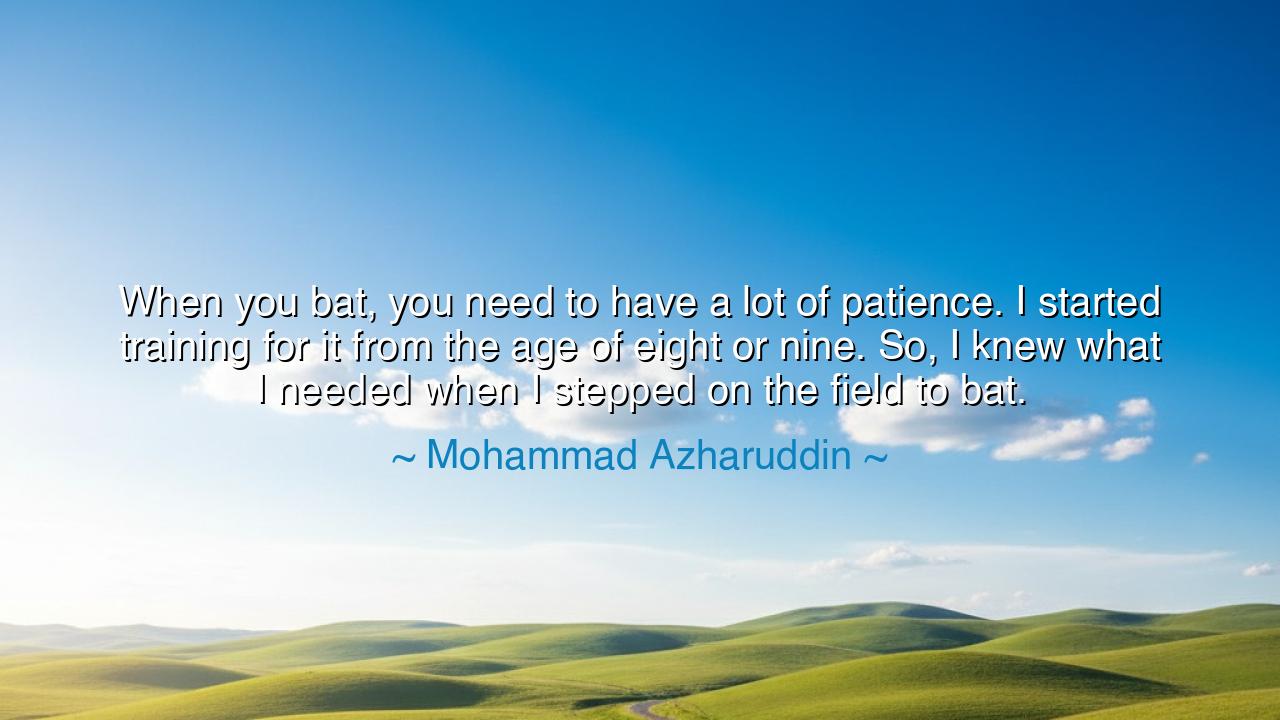
When you bat, you need to have a lot of patience. I started
When you bat, you need to have a lot of patience. I started training for it from the age of eight or nine. So, I knew what I needed when I stepped on the field to bat.






Hear the words of Mohammad Azharuddin: “When you bat, you need to have a lot of patience. I started training for it from the age of eight or nine. So, I knew what I needed when I stepped on the field to bat.” These words are not merely about the game of cricket, but about the deeper discipline of life itself. For every great endeavor, like every innings, requires not only skill, but the quiet endurance of the spirit, the ability to wait, to watch, and to strike only when the moment is right.
To bat is not simply to swing the willow against the ball—it is to stand firm against pressure, against the roar of the crowd, against the cunning of the bowler, against the passage of time itself. The one who would succeed must possess not only strength, but patience. Rashness leads to downfall; haste leads to failure. Just as Azharuddin began training from the days of his youth, so must all who aspire to greatness cultivate the inner calm that sustains them when storms arise.
History reminds us of this truth. Consider the Roman general Fabius Maximus, who earned the name “Cunctator”—the Delayer. When Hannibal invaded Italy, many cried for immediate battle, but Fabius counseled restraint. With patience, he wore down the enemy, refusing to be lured into reckless combat. Though mocked at first, his method saved Rome. Like a batsman on the field, he knew that victory does not always belong to the swift, but to the steady hand that endures. Azharuddin’s words echo the same eternal wisdom: to rush is to fall, but to wait is to triumph.
Azharuddin’s story also reminds us of the power of training begun early. At eight or nine years old, he was already shaping the habits of mind and body that would guide him on the greatest stages. The lesson is clear: greatness does not bloom overnight. It is forged in the fires of daily practice, in the small sacrifices repeated again and again until they become the foundation of unshakable confidence. When he stepped onto the field, he was not uncertain, for he had already prepared his soul through years of labor.
The teaching extends beyond cricket. In every pursuit—whether art, scholarship, leadership, or love—the same truth applies. One must cultivate patience, not only in waiting for results, but in preparing oneself long before the test arrives. The warrior sharpens his blade before battle. The farmer tends the soil before the harvest. The musician practices scales before the concert. And so the wise one enters life’s challenges with steady breath, not anxious improvisation, for they “knew what they needed” long before the trial came.
There is also humility in his words. Azharuddin does not boast of natural talent alone, but of discipline, of learning, of years of quiet persistence. The lesson is that true mastery is not born of a single gift, but of gifts refined through endless shaping. Patience is not weakness—it is strength in its most enduring form. It is the courage to hold steady when others rush, the wisdom to wait when others falter, and the resilience to stand again and again until the moment of triumph arrives.
Practical wisdom follows. In your own life, begin your training today, whatever your pursuit may be. Practice patience in small things—wait your turn, listen deeply, endure setbacks without bitterness. For these small acts are the drills that prepare you for the great innings of life. Do not be disheartened by delays or failures; see them as the bowler’s deliveries testing your resolve. Hold steady, trust your preparation, and in time, you too will find your moment to strike with power and grace.
Thus, let Azharuddin’s words endure as a teaching: to bat in life is to face trial with patience, to prepare long before the test, and to step forward with confidence born of discipline. The field of destiny awaits each of us, and when our moment comes, may we, like him, say with certainty: “I knew what I needed when I stepped onto the field.”






AAdministratorAdministrator
Welcome, honored guests. Please leave a comment, we will respond soon